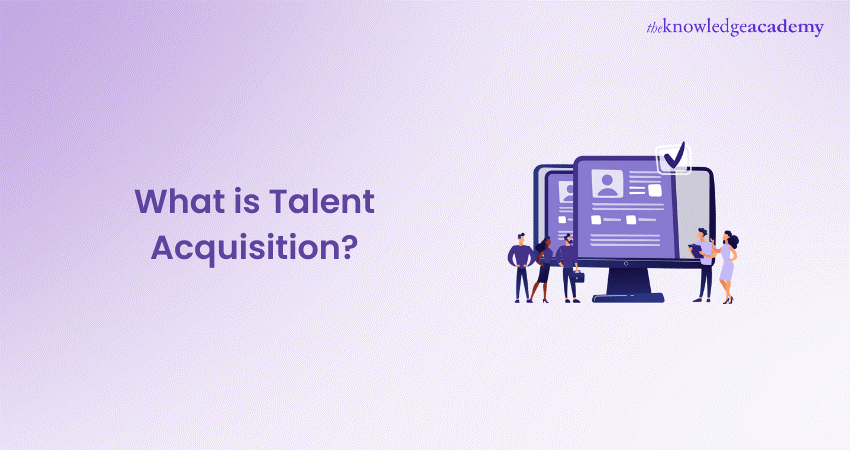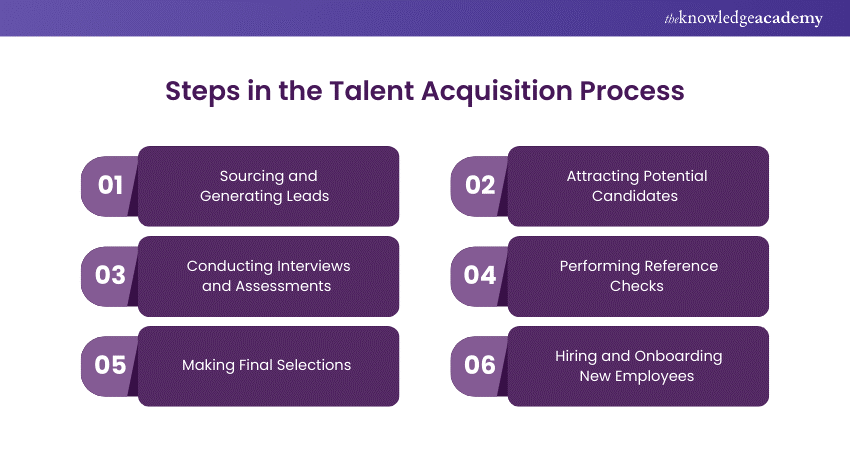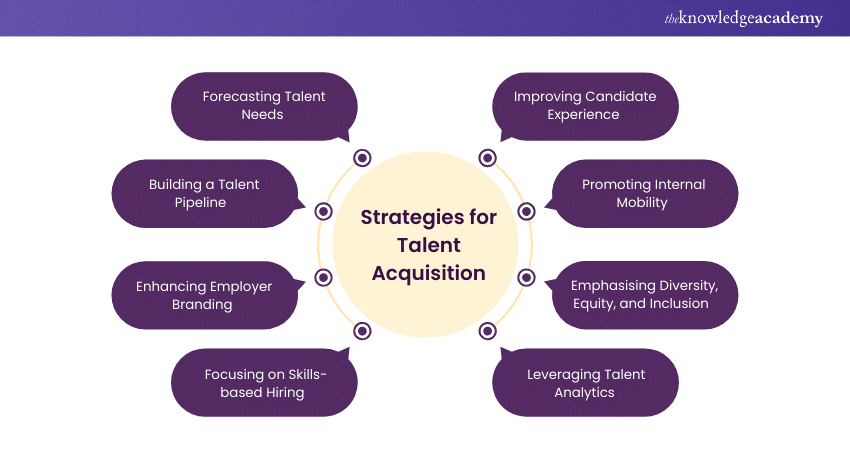We may not have the course you’re looking for. If you enquire or give us a call on + 1-866 272 8822 and speak to our training experts, we may still be able to help with your training requirements.
Training Outcomes Within Your Budget!
We ensure quality, budget-alignment, and timely delivery by our expert instructors.

Do you know that the right talent is necessary for a company to run smoothly? Well! Many companies find it difficult to find the right fit for them. That’s where Talent Acquisition comes into the picture.
Talent Acquisition goes beyond recruitment and focus on long-term success and workforce growth. If a company has effective Talent Acquisition, they can secure top talent. This will enhance productivity and help them stay competitive. Read this blog to learn how mastering Talent Acquisition can transform your hiring process. Be ready to build a stronger, more capable team.
Table of Contents
1) What is Talent Acquisition?
2) Difference Between Talent Acquisition and Recruitment
3) Steps in the Talent Acquisition Process
4) Talent Acquisition Strategies
5) Conclusion
What is Talent Acquisition?
Talent Acquisition is a necessity for every company to grow in their field. This team help identify and hire skilled employees who can fulfil the various requirements of the company involves finding, evaluating, and recruiting candidates for available roles.
Talent Acquisition starts with creating a positive employer image. This involves showcasing company culture, values, and benefits to attract top talent. It also includes planning for future staffing needs and ensuring the organisation is ready to adapt to growth or changes.
In some companies, the Talent Acquisition team operates within the Human Resources (HR) division. In some cases, it functions independently while working together with HR. Professionals in Talent Acquisition excel in sourcing tactics, identifying and attracting top candidates through various channels and networks. They also possess strong skills in evaluating candidates to ensure the best fit for the organisation’s roles and culture.
Difference Between Talent Acquisition and Recruitment
Talent Acquisition and Recruitment are like the two sides of the same coin. Both of them share the same objective of hiring people to fill open positions. While Talent Acquisition and Recruitment are similar in many ways, there are also important differences.
Think of it like this: Recruitment is like signing free agents in sports, where teams quickly fill immediate needs. However, Talent Acquisition is about long-term team success. This includes drafting young talent and staying financially flexible. It also includes hiring a coaching staff that creates a winning culture and maintaining that culture over time.
If we say, in short, recruiters fill vacancies. At the same time, Talent Acquisition consultants use an ongoing strategy of identifying specialists, leaders, and future executives for your organisation. Talent Acquisition departments focus more on long-term human resources planning rather than short-term labour demand.
Steps in the Talent Acquisition Process
A Talent Acquisition strategy typically involves six key steps, ranging from initial research to successful onboarding. Taking a structured approach to Talent Acquisition often yields the best results.

1) Sourcing and Generating Leads
The first step is identifying potential candidates by sourcing talent from various pools. This can include networking, re-engaging past applicants, forming committees, and enhancing employer branding to attract new candidates.
2) Attracting Potential Candidates
To attract top talent, it’s essential to have a compelling company profile ready. This should include the organisation's mission, culture, benefits, and compensation. Standing out from competitors at this stage is key to attracting the best candidates.
3) Conducting Interviews and Assessments
Once candidates are sourced and interested, the interviewing process begins. This may involve group interviews, progressive interviews with senior staff, or virtual interviews for remote candidates, depending on the organisation's process.
4) Performing Reference Checks
Thorough reference checks are critical to making informed hiring decisions. This includes contacting previous managers and possibly conducting background checks before extending an offer.
5) Making Final Selections
The final decision should be a collaborative effort involving the hiring manager, Talent Acquisition team, HR, and other relevant Stakeholders. It’s crucial to take the time needed to ensure the right fit, as the selected candidate will play a vital role in company culture and performance.
6) Hiring and Onboarding New Employees
After an offer is made, onboarding begins. Here's how it works:
a) The first step is to send welcome emails
b) Second step is all about introductions
c) The third step is to share information about the benefits
d) Final step is to provide necessary resources for the new employee
Enhance your team performance and productivity with our Successful People Management and Team Leadership – Sign up today!
Talent Acquisition Strategies
Recruitment is a constantly evolving field, and top organisations recognise the need to adapt their Talent Acquisition strategies to address new opportunities and challenges. Strategies may vary based on business needs, hiring pain points, and available resources.

1) Forecasting Talent Needs
Forward-thinking Talent Acquisition teams plan for the future needs and goals of their organisation to adapt to changing conditions. Identify which roles are hardest to fill and prioritise them. Positions requiring niche skills, specific experience, tech or engineering expertise, and senior leadership can take three to six months or longer to fill.
Planning helps in hiring the right person, promoting team members, and building teams on short notice. Prepare for economic fluctuations by considering contractors, gig workers, part-time employees, and flex workers to address dynamic staffing needs.
2) Building a Talent Pipeline
Modern Talent Acquisition includes long-term thinking beyond immediate needs. Track candidates using simple spreadsheets or specialised software like an applicant tracking system. Schedule time for Talent Acquisition activities such as networking, outreach, updating candidate details, and building relationships for future roles.
Avoid siloing HR and Talent Acquisition efforts and involve the entire company. Introduce employee referral programs, monetary rewards for key hires, and public recognition for top referrers to find qualified candidates faster.
3) Enhancing Employer Branding
A strong employer brand is crucial for attracting quality candidates. Ensure your organisation’s website, social profiles, and company culture appeal to potential candidates. Branding efforts, often led by marketing, communications, or HR departments, are essential for grabbing the attention of skilled talent and encouraging them to apply.
4) Focusing on Skills-based Hiring
Traditional proxies like education or years of experience often exclude qualified candidates. Skills-based hiring focuses on evaluating candidates based on their skills rather than their pedigree. Remove degree requirements from job descriptions and focus on responsibilities and competencies.
5) Improving Candidate Experience
By providing a positive experience, you can entice more job seekers and increase the likelihood of top candidates accepting your offer. To achieve this, invest in delivering a seamless and respectful journey from pre-application to onboarding. This involves:
a) Timely communication
b) Transparency
c) Feedback exchange
6) Promoting Internal Mobility
This business and HR strategy focuses on developing and promoting employees from within the company, rather than seeking external candidates to fill open positions.
Internal mobility begins with identifying top performers within the organisation and investing time in training and preparing them for increased responsibilities and leadership roles. Companies can plan for this well in advance by offering career pathing, regular and detailed feedback, internal mentorship initiatives, high-quality employee training, and stretch assignments.
Regularly circulate a list of open roles via an internal wiki or email, so employees are aware of job openings and can express their interest.
7) Emphasising Diversity, Equity, and Inclusion
A diverse team can offer various perspectives and backgrounds, fostering creative ideas and distinctiveness. While Talent Acquisition is not the only department in charge of creating a diverse team, there are multiple techniques to support your organisation's DEI strategy.
This involves creating job ads that are welcoming to all, actively searching for candidates from different backgrounds, and combating prejudice during the hiring process. Having a just hiring process for marginalised candidates is crucial in fostering a more diverse workplace.
8) Leveraging Talent Analytics
Modern Talent Acquisition software enables a data-driven approach to Decision-Making. Talent analytics are essential for optimising recruitment processes and achieving the best hiring outcomes. For example, you can identify which candidate sources yield quality applicants, and which are less effective, helping you allocate your recruitment marketing budget more efficiently.
By following these strategies, organisations can adapt their Talent Acquisition processes to meet evolving needs and challenges. This approach attracts top talent and also creates a positive and productive work environment.
Learn to inspire, motivate, and lead diverse teams successfully with our in-depth People Management Courses – Register today!
Conclusion
Talent Acquisition is an important process in a company. This team identify, attract, and hire skilled people to meet an organisation’s needs. It focuses on long-term planning, building a talent pipeline, and aligning the right candidates with business goals to ensure sustainable growth and success.
Develop advanced skills in sourcing, evaluating, and hiring talent to meet your company’s needs with our Talent Acquisition Training – Join now!
Frequently Asked Questions

Common challenges include finding qualified candidates, long hiring processes, and competition for top talent. These can be addressed by using skills-based hiring, improving candidate experience, leveraging talent analytics, and enhancing employer branding to attract the right talent quickly.

Key metrics include time-to-hire, quality of hire, candidate satisfaction, and cost-per-hire. Tracking these metrics helps optimise recruitment processes, reduce costs, and improve overall hiring efficiency, ensuring the right talent is brought on board swiftly and effectively.

The Knowledge Academy takes global learning to new heights, offering over 30,000 online courses across 490+ locations in 220 countries. This expansive reach ensures accessibility and convenience for learners worldwide.
Alongside our diverse Online Course Catalogue, encompassing 19 major categories, we go the extra mile by providing a plethora of free educational Online Resources like News updates, Blogs, videos, webinars, and interview questions. Tailoring learning experiences further, professionals can maximise value with customisable Course Bundles of TKA.

The Knowledge Academy’s Knowledge Pass, a prepaid voucher, adds another layer of flexibility, allowing course bookings over a 12-month period. Join us on a journey where education knows no bounds.

The Knowledge Academy offers various People Management Courses, including Talent Acquisition Training, Talent Management Training and Successful People Management and Team Leadership Training. These courses cater to different skill levels, providing comprehensive insights into Talent Management.
Our HR Resources Blogs cover a range of topics related to Talent Acquisition, offering valuable resources, best practices, and industry insights. Whether you are a beginner or looking to advance your HR Management skills, The Knowledge Academy's diverse courses and informative blogs have you covered.
Upcoming HR Resources – Learn about Human Resources Batches & Dates
Date
 Talent Acquisition Training
Talent Acquisition Training
Fri 17th Jan 2025
Fri 21st Feb 2025
Fri 4th Apr 2025
Fri 6th Jun 2025
Fri 25th Jul 2025
Fri 7th Nov 2025
Fri 26th Dec 2025







 Top Rated Course
Top Rated Course



 If you wish to make any changes to your course, please
If you wish to make any changes to your course, please


